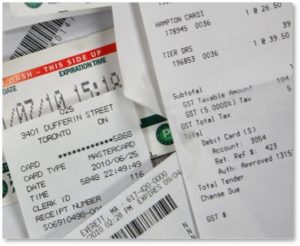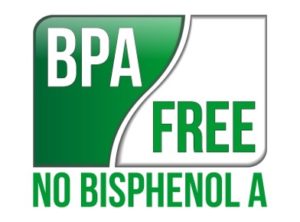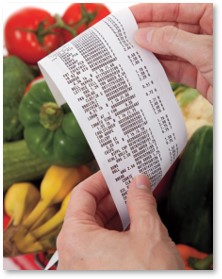 You see them every day. You probably touch them every day. People hand them to you at the supermarket, the hardware store, the fruit stand, the bookstore, and pretty much anywhere you spend money to purchase something.
You see them every day. You probably touch them every day. People hand them to you at the supermarket, the hardware store, the fruit stand, the bookstore, and pretty much anywhere you spend money to purchase something.
It’s those pesky cash register receipts. Some are small and some, like those from CVS, are so long you can measure your height with them. The employee at the checkout register rings up your purchase and hands you the receipt. You stuff it in your purse, your pocket, your wallet, or the bag. And when you get home you either throw them out or recycle them.
“Well, recycling is better because they are just paper, right?”
Wrong.
Cash Register Receipts and BPA
According to the Environmental Working Group, two-fifths of the paper receipts tested by a major laboratory they commissioned were on heat-activated paper that was between 0.8 to nearly 3 percent pure BPA by weight.
“Wait? You’re telling me that my friendly supermarket checkout person
is handing me poison?”
 Yup. At least you’re only touching it once. He or she is doing it all day long. The Centers for Disease Control found that people who reported working in retail industries had 30 percent more BPA in their bodies than the average U.S. adult, and 34 percent more BPA than other workers.
Yup. At least you’re only touching it once. He or she is doing it all day long. The Centers for Disease Control found that people who reported working in retail industries had 30 percent more BPA in their bodies than the average U.S. adult, and 34 percent more BPA than other workers.
The cashiers often hand you the receipt with your change, if you use cash. That transfers the BPA to the money, which you will handle later. And if your receipt includes coupons, like the CVS receipts do, then you trade a dose of BPA for a discount.
“So, what happens when I touch one of these receipts?”
The BPA goes straight into your body through dermal transmission. Just touching that innocent piece of paper for five seconds transfers a significant amount of BPA to your finger. Touch your groceries, like when you put them away at home, and you transfer the BPA to the food. Which you will eat.
“Then I will just wash my hands when I get home.”
Too late. The BPA is already in your body from when you accepted the receipt. A 2010 study published by Swiss scientists found that BPA transfers readily from receipts to skin and can penetrate the skin to such a depth that it cannot be washed off.
Why BPA is Bad for Humans
“Umm, is BPA that bad?”
Well, yes, it is. According to Healthline,
“ Due to its estrogen-like shape, BPA can bind to estrogen receptors and influence bodily processes, such as growth, cell repair, fetal development, energy levels, and reproduction. In addition, BPA may also interact with other hormone receptors, such as those for your thyroid, thus altering their function (8Trusted Source). Your body is sensitive to changes in hormone levels, which is the reason why BPA’s ability to mimic estrogen is believed to affect your health.”
“But how much of this stuff is in cash register receipts, really?”
A lot. According to John C. Warner in Science News:
“When people talk about polycarbonate bottles, they talk about nanogram quantities of BPA [leaching out]. The average cash register receipt that’s out there and uses the BPA technology will have 60 to 100 milligrams of free BPA.”
Effects of BPA on Human Health
“What does BPA do that makes it so dangerous?”
 BPA has been connected to a wide variety of health effects, particularly those regarding reproduction and infancy. It has been shown to:
BPA has been connected to a wide variety of health effects, particularly those regarding reproduction and infancy. It has been shown to:
- Cause infertility in men and women
- Have negative effects on fetuses and babies
- Link to heart disease and Type 2 diabetes
- Raise your risk of obesity
- Increase risk of seven other medical problems, including cancer, premature puberty, thyroid problems, and asthma.
Reasons Not to Recycle Cash Register Receipts
“So should get rid of them. But why shouldn’t I recycle them?”
The answer is simple: because recycling releases BPA into the environment. The plastic coating contaminates paper batches sent to re-manufacturing plants. When it does get recycled, it re-appears in products like shopping bags that you will be touching over and over.
“Well, can I compost them or burn them, then?”
No, neither one. If you compost the receipts, you release BPA into surface water, where people will come in contact with it. If you burn them, you release the BPA into the air, where you breathe it.
BPA is kind of like poison ivy: You can’t compost it, shred it or burn it because it will hang around and bite you when you don’t see it coming. Just put them in the trash. It’s not a great solution but it beats the alternatives.
Which Ones Are Safe?
While not all cash register receipts are printed on thermal paper coated with BPA, you have no way of knowing which ones are safe. According to EWG, Target, Starbucks and Bank of America ATMs issued receipts that were BPA-free or contained only trace amounts. On the other hand, McDonald’s, CVS, KFC, Whole Foods, Walmart, Safeway and the U.S. Postal Service issue BPA-coated receipts.
The best way to avoid touching contaminated cash register receipts is to have electronic receipts sent to you whenever possible. Unfortunately, e-receipts are not always an option. So toss those receipts and don’t recycle them.

